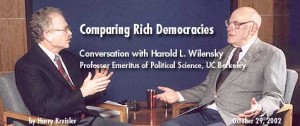
This interview is part of the Institute's “Conversations with History” series, and uses Internet technology to share with the public Berkeley's distinction as a global forum for ideas.
In this landmark work, the culmination of thirty years of systematic, comprehensive comparison of nineteen rich democracies, Wilensky answers two basic questions: What is distinctly modern about modern societies? In what ways are they becoming alike, and how do variations in types of political economy shape system performance? The book is being hailed as “a monumental work,” “an instant classic,” “a truly amazing accomplishment.”
- Background … influence of parents … impact of the Depression … importance of education … impact of World War II … interest in understanding society … education
- Working with Labor Unions … the labor movement … first research jobs
- Being a Social Scientist … graduate school at Chicago … skills … temperament … defining the problem so that it can be disconfirmed
- Research Methods … importance of interdisciplinary study … follow the problem … importance of comparative studies … qualitative versus quantitative research
- Comparing Rich Democracies: Theory … defining modernity and social change … convergence theory … mass society theory
- Comparing Rich Democracies: Examples … political economy structures … tax revolts … mayhem index
- Conclusion … advice for students









